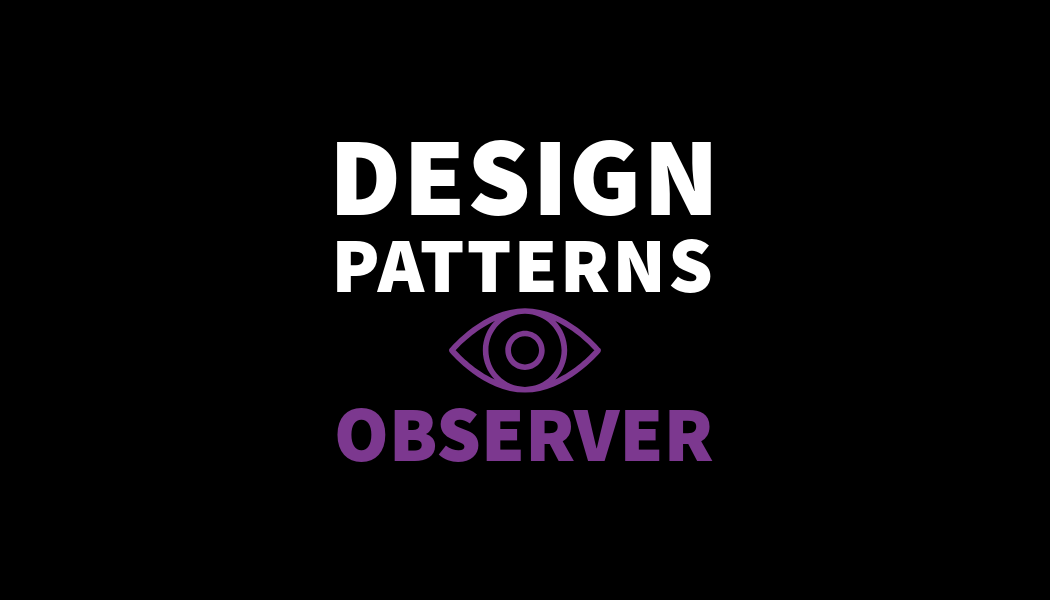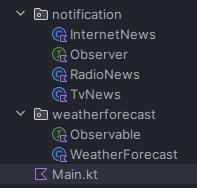Design patterns: Observer

Observer is one of behavioral design patterns. It define one-to-many dependency between objects. This dependency relies on notifying many observator objects about changes and events, that happen innside the object, which is observed by they.
Problem
Imagine weather forecast application, which regularly receive updates about current weather (for example every hour) from weather service. This forecast may include data such as temperature, humidity, pressure or wind speed.
Application would like to notify various users or devices about each change in the forecast. Observer design pattern can ensure, that each registered receiver will be notified automatically, whenever there is a change in weather data.
Implementation (Kotlin)
Project structure

Observer.kt
interface Observer {
fun updateForecast(weatherForecast: WeatherForecast)
}
InternetNews.kt
class InternetNews : Observer {
override fun updateForecast(weatherForecast: WeatherForecast) {
println(
"Internet: New weather forecast: temperature: ${weatherForecast.temperature}^C pressure: ${weatherForecast.pressure}hPa")
}
}
RadioNews.kt
class RadioNews : Observer {
override fun updateForecast(weatherForecast: WeatherForecast) {
println(
"Radio: New weather forecast: temperature: ${weatherForecast.temperature}^C pressure: ${weatherForecast.pressure}hPa")
}
}
TvNews.kt
class TvNews : Observer {
override fun updateForecast(weatherForecast: WeatherForecast) {
println(
"TV: New weather forecast: temperature: ${weatherForecast.temperature}^C pressure: ${weatherForecast.pressure}hPa")
}
}
Observable.kt
interface Observable {
fun registerObserver(observer: Observer)
fun unregisterObserver(observer: Observer)
fun notifyObservers()
}
WeatherForecast.kt
class WeatherForecast(
var temperature: Number,
var pressure: Number
) : Observable {
private var registeredObservers: MutableSet<Observer> = mutableSetOf()
override fun registerObserver(observer: Observer) {
registeredObservers.add(observer)
}
override fun unregisterObserver(observer: Observer) {
registeredObservers.remove(observer)
}
override fun notifyObservers() {
registeredObservers.forEach { observer ->
observer.updateForecast(this)
}
}
fun updateForecast(temperature: Number, pressure: Number) {
this.temperature = temperature;
this.pressure = pressure;
notifyObservers()
}
}
Main.kt
fun main() {
val weatherForecast = WeatherForecast(25, 1003)
val radioNews = RadioNews()
val internetNews = InternetNews()
val tvNews = TvNews()
weatherForecast.registerObserver(radioNews)
weatherForecast.registerObserver(internetNews)
weatherForecast.registerObserver(tvNews)
weatherForecast.notifyObservers()
weatherForecast.unregisterObserver(tvNews)
weatherForecast.unregisterObserver(radioNews)
println("New forecast - notification only for internet:")
weatherForecast.updateForecast(18, 1007)
}
Output

Explanation
This is implementation of app, which solve problem described in Problem section.
Firstly, we create Observer interface, which is implemented by classes, whose objects will be observers of observable object. In this app observer classes are: InternetNews, RadioNews and TvNews. Each of them implement updateForecast() method to notify followers of particular information source in proper way.
In weatherforecast package we can find Observable interface, which is implemented by object observable by observers. In our case It will be WeatherForecast class.
In main method firstly we create objects of observable class (WeatherForecast) and of observer classes (RadioNews, InternetNews, TvNews). Observable class contain set of its observers, so we can register observer with registerObserver() method. At the beginning each of possible observers are observing our weather forecast. We can notify each of them manually with notifyObservers() method. As you can see - it works. Let's assume that for some reason we want to notify only the InternetNews about the next update, so we would like to unregister TvNews and RadioNews observers with unregisterObserver() method. And the last step is to update forecast. As you can see, when forecast was updated, InternetNews observer was notified about this change.
Your implementation can be different! Treat this as a typical demonstration example.
Pros and Cons
✅ Observable doesn't need to know the details of its observers, making it easy to add or remove observers without modifying the observable.
✅ New observers can be added dynamically without affecting the observable or other observers.
❌ Observators are notified in random order.